— By Chris Gonzales, Freelance Science Writer, New York Sea Grant
Stony Brook, NY, November 20, 2023 - The 45th class of Knauss Fellowship finalists was recently announced. In honor of the occasion, we reached out to NYSG's 2023 Knauss fellows and collected these updates, in their own words ...
Lisa Crawford
Fishery Management Specialist
NOAA Fisheries, Office of Sustainable Fisheries, Highly Migratory Species Management Division
I am having a wonderful time in my placement with the NOAA Fisheries Highly Migratory Species Management Division. Working in this position has allowed me to directly apply my expertise from my PhD to highly migratory species (sharks, tunas, billfishes, and swordfish) management. I've had almost too many opportunities to count--from issuing Exempted Fishing Permits for researchers and publishing bluefin tuna fishery quota transfers and closures, to analyzing the impacts of climate change on highly migratory species and synthesizing research to inform a potential endangered species listing, all the way to serving as a member of the US Delegation during international fisheries negotiations and engaging directly with stakeholders during public hearings. I'm very grateful for the mentorship and thorough introduction to science policy that I've received through the Fellowship. I feel very confident that I want to continue in this line of work moving forward.
My favorite part of the Fellowship so far was having the opportunity to volunteer as a science crew member on board the NOAA Ship Oregon II for the Southeast Fisheries Science Center shark and red snapper bottom longline survey. I made many amazing connections with crew members, science center staff, and my fellow volunteers. I love working on the water, and I was thrilled to be participating in research and working hands-on with sharks again. I am so grateful for this experience and the skills and friendships I gained along the way.
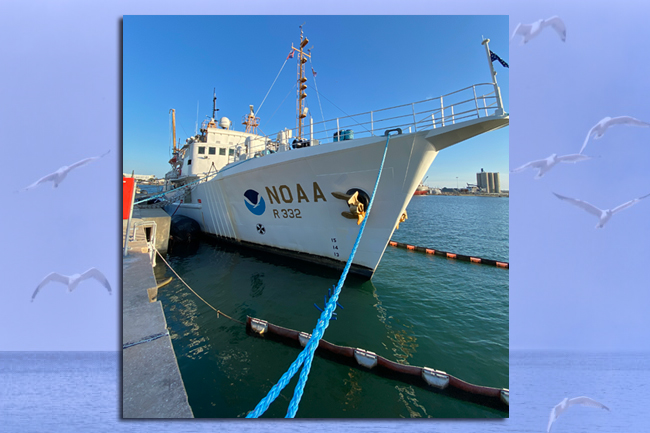
NOAA Ship Oregon II used for the Southeast Fisheries Science Center shark and red snapper bottom longline survey. Credit: Lisa Crawford
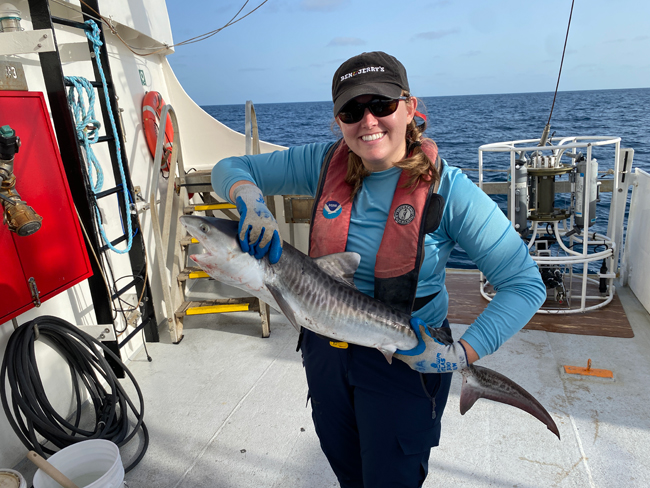
Lisa holding a baby tiger shark on board the NOAA Ship Oregon II during the shark and red snapper bottom longline survey in the Gulf of Mexico. Credit: Eric Hoffmayer
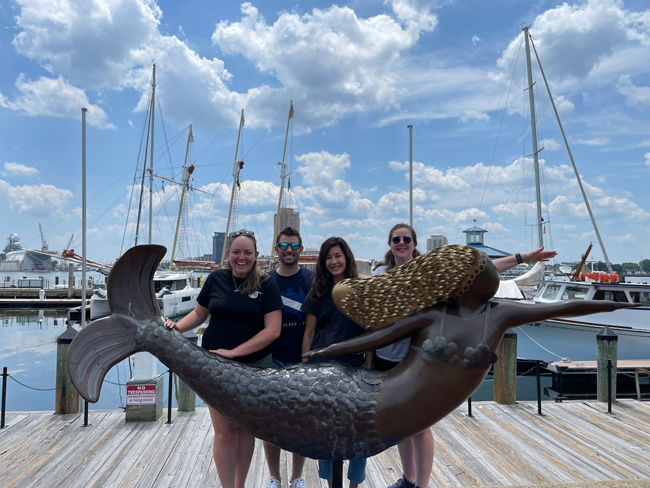
Lisa (left) with members of the NOAA Highly Migratory Species Management Division [Dan Crear (left center), Ann Williamson (right center), Karyl Brewster-Geisz (right)] at the Joint Meeting of Ichthyologists and Herpetologists in Norfolk, VA at the Waterside. Credit: Charlie Edelson
Amelia-Juliette Demery
Ocean Policy Fellow
National Science Foundation (NSF) Division of Ocean Sciences
I have had a great time working at the National Science Foundation's (NSF) Division of Ocean Sciences as an Ocean Policy Fellow. In this capacity, I support the Directorate Director Alex Isern and the Division Director James McManus, with my mentor Stacy Aguilera-Peterson, Senior Ocean Policy Specialist and a former Knauss Fellow. Working within the NSF and in interagency frameworks within various White House committees, I have had the privilege to observe how the government works at multiple scales of government with regards to research and development in the oceans, coastlines, and Great Lakes. It is exciting to help coordinate and strategize policies that are integral to our knowledge of the ocean and its various intersections. For example, I have been a part of implementing the Ocean Climate Action Plan across spheres including but not limited to carbon dioxide removal, ocean acidification, marine biodiversity, and eDNA applications. Through this role I get to experience the full expanse of turning a set of initiatives into action, and the scale needed to ensure that multiple agencies function seamlessly to realize the efforts framed in policy.
Being at the forefront of policy strategy and design is one of my favorite parts of the job. One highlight has been co-writing the Ocean Justice Strategy. This Federal guidance, part of the Ocean Climate Action Plan, is designed to advance ocean justice through a whole-of-government approach, incorporating stakeholders’ connections to the waters to guide ethical Federal activities. It has been an immense privilege to interact with diverse stakeholders within and beyond the Federal Government on what the ocean means to them and then be able to put those thoughts and sentiments into action that can realize authentic Federal–non-Federal collaborations. I have also enjoyed working with the G7 Future of the Seas and Ocean Initiative (G7 FSOI), where I support international efforts in ocean policy, identifying shared goals and aligning efforts into multi-national partnerships. As part of the U.S. delegation, I look forward to attending the in-person G7 FSOI business meeting in Tokyo, Japan, later this year.
By far my favorite part about my fellowship is the people. The Ocean Policy team, including Jim, Stacy, and Program Analyst Lindsay Martin, are great professionals to work with and learn from. As a PhD candidate who defends in a month, I have learned so much with people who support me in my academic and professional career, and it makes me so excited to keep working in this space at the nexus of ocean, research, and policy.
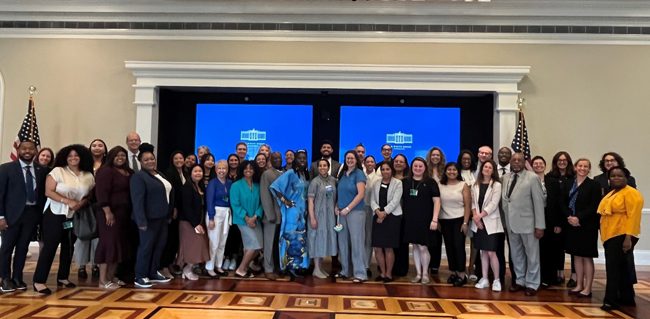
Amelia-Juliette (center back) poses with non-Federal stakeholders during the inaugural White House Ocean Justice Strategy Roundtable. Credit: Mackenzie Solomon
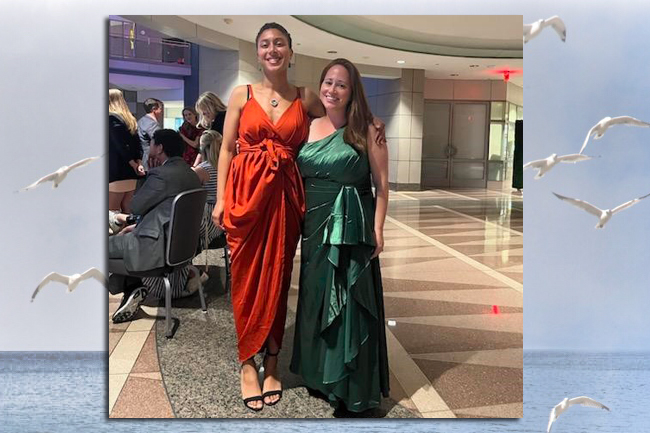
Amelia-Juliette and her mentor Dr. Stacy Aguilera-Peterson at the Capitol Hill Oceans Week Gala. Credit: Lindsay Martin
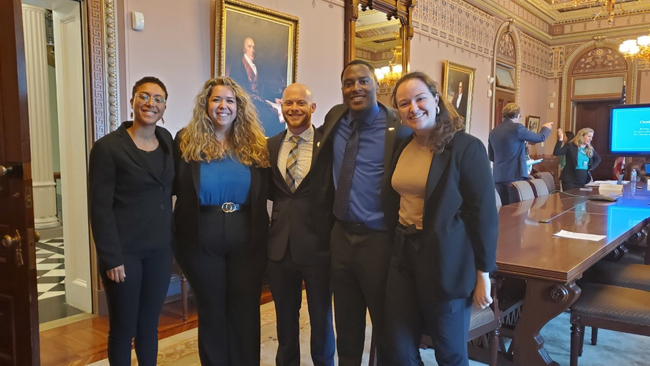
Amelia-Juliette with other Knauss Fellows at the Spring White House Ocean Policy Committee membership meeting. From left to right: Amelia-Juliette Demery, Margaret Carson, Grant Voirol, De’Marcus Robinson, Tacey Hicks. Credit: Lindsay Martin
Noah Khalsa
Knauss Marine Policy Fellow
US House of Representatives Committee on Science, Space, and Technology
Environment Subcommittee (minority)
For my fellowship year, I have been working with the Environment Subcommittee of the U.S. House Committee on Science, Space, and Technology (minority) on the NOAA research and development policy portfolio. Throughout the year I have had the unique opportunity to look behind the curtain at how our government functions and how science is supported by Congress. No two days are the same, but most of my activities include engaging with stakeholders, preparing for hearings, and doing background research for and writing legislation. One of the aspects of my position that I enjoy the most is getting to discuss NOAA’s scientific priorities with their top brass and figuring out how our team can help develop policies that support them. Additionally, ensuring that policy coming out of the House is in-line with the best available science is an exciting aspect of my position.
I have had quite a few cool experiences so far, but my favorite was getting to be on the House floor for votes on two bills our team worked on. What was super special was that floor remarks I wrote for the bills were read by a Congress member, I ended up on C-Span, and one of the bills (addressing ocean acidification) passed. Another awesome experience has been contributing to the reauthorization of the Weather Act, which is a massive piece of legislation that provides authorization for myriad activities contributing to weather and climate science at NOAA. Last, but certainly not least, I have gotten to lead the preparation for two committee hearings, one on the users of weather data and areas of improvement, and one on fire weather innovations and predictions.
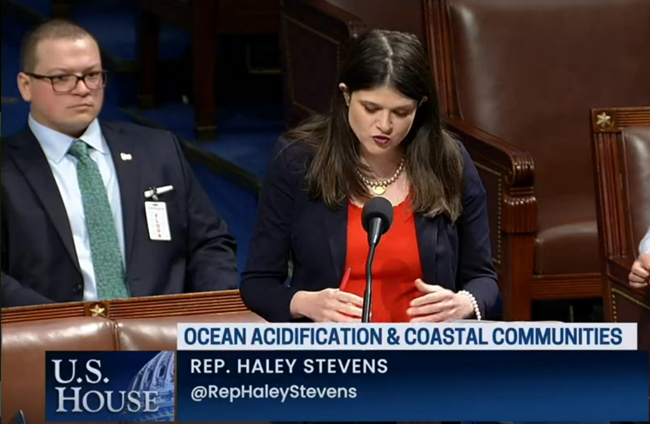
Noah on C-SPAN while floor remarks he wrote for the Coastal Communities Ocean Acidification Act of 2023 are read by Rep. Haley Stevens (D-MI) before votes on the House floor. The bill was passed. (Screenshot of recording of House Session 2, May 9th 2023 from C-SPAN)
Omisha Manglani
Legislative Fellow
Office of Senator Jeff Merkley (D-Oregon)
I am grateful for the opportunity to serve as a legislative assistant to U.S. Senator Jeff Merkley (D-OR), advising him on several policy areas including the environment and agriculture. As the lead on oceans issues, saying that fisheries on the West Coast are complex— is an understatement. Dams, offshore wind, climate change, habitats collapsing … the list goes on. Working in the Senate, I’ve had access to decision-making and learning about how the federal government runs.
Through the Knauss Fellowship, I’ve gained experience learning from people on the ground, such as fishermen and Tribes, about the unique issues they face, and affecting policymaking while writing bills, assisting in the appropriations process, and developing solutions that are equitable and sustainable. Working to address the dynamic challenges facing humanity while representing the Senator, who cares immensely about the environment and communities, has provided me with a unique perspective on the politics of environmental justice. I look forward to continuing to address environmental challenges as they intersect with social equity in my career of science-based policymaking through this fellowship and beyond.
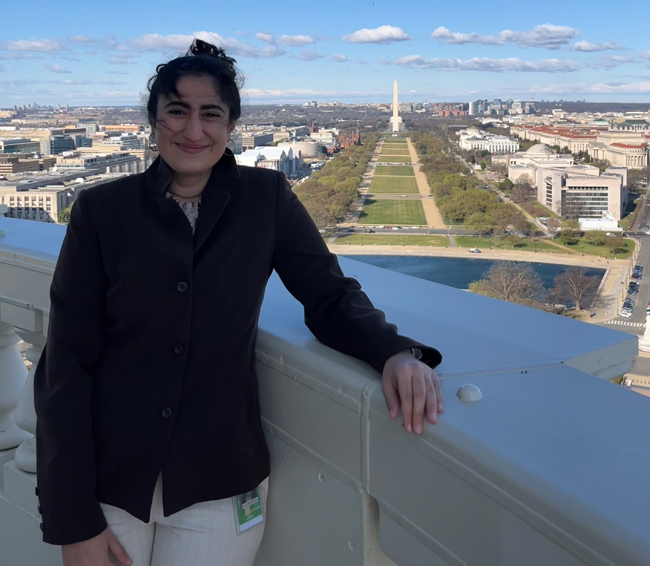
At the top of the Capitol Dome with fellow Merkley staffers, Omisha had the chance to take in the landscape of D.C. and embrace the (Team Merkley) perspective of “Taking on the powerful to deliver for the People.” Credit: Brianna Iddings Mattox

Omisha staffing Senator Merkley for a hearing on the impacts of and solutions to plastic pollution. Video credit: U.S. Senate Committee on Environment and Public Works.
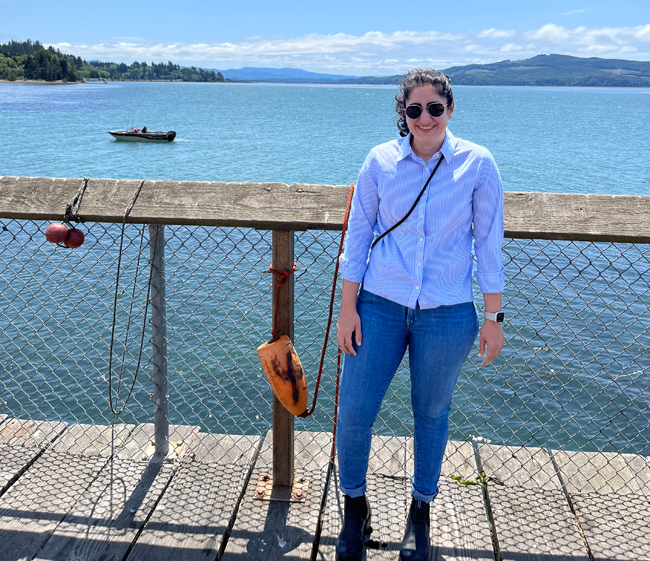
Omisha on the North Coast of Oregon during a state visit, meeting constituents and learning about the issues faced on the ground. Credit: Betsy Emery
More Info: New York Sea Grant
New York Sea Grant (NYSG), a cooperative program of Cornell University
and the State University of New York (SUNY), is one of 34 university-based
programs under the National Oceanic and Atmospheric Administration’s
National Sea Grant College Program.
Since 1971, NYSG has represented a statewide network of integrated
research, education and extension services promoting coastal community
economic vitality, environmental sustainability and citizen awareness
and understanding about the State’s marine and Great Lakes resources.
Through NYSG’s efforts, the combined talents of university scientists
and extension specialists help develop and transfer science-based
information to many coastal user groups—businesses and industries,
federal, state and local government decision-makers and agency managers,
educators, the media and the interested public.
The program maintains Great Lakes offices at Cornell University, SUNY
Buffalo, SUNY Oswego and the Wayne County Cooperative Extension office
in Newark. In the State's marine waters, NYSG has offices at Stony Brook
University and with Cornell Cooperative Extension of Nassau County on Long Island, Brooklyn College and Cornell Cooperative
Extension in NYC and Kingston in the Hudson Valley.
For updates on Sea Grant activities: www.nyseagrant.org has RSS, Facebook, Twitter, Instagram, and YouTube links. NYSG offers a free e-list sign up via www.nyseagrant.org/nycoastlines for its flagship publication, NY Coastlines/Currents, which is published quarterly.